【最新】外研版八年级英语下册教学案Module 2 Exercise 期中复习1
2023年外研版八年级英语下册教学案:Module 2 Exercise 期中复习2
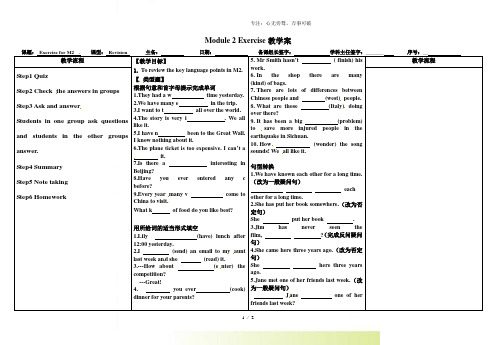
Step2 Check the answers in groups
Step3 Ask and answer
Students in one group ask questions and students in the other groups answer.
Step4 Summary
What kof food do you like best?
用所给词的适当形式填空
1.Lily(have) lunch after 12:00 yesterday.
2.I(send) an email to my aunt last week an d she(read) it.
3.---How about(e nter) the competition?
Step5 Note taking
Step6 Homework
注:按照健康课堂相应课型流程编写。
---Great!
4.you ever(cook) dinner for your parents?
5.Mr Smithhasn’t( finish) his work.
6.In the shop there are many(kind) of bags.
7.There are lots of differences between Chinese people and(west) people.
8.What are those(Italy) doing over there?
9.It has been a big(problem) to save more injured people in the earthquake inSichuan.
(完整版)外研版八年级下册Module2教案
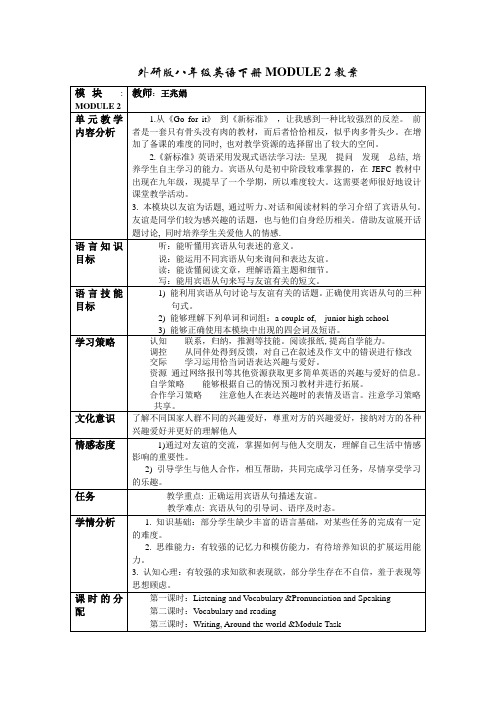
Where are you from?既是为了活跃课堂气氛,激发学生的学习兴趣, 又是为 了能很快进入主题 Can you tell me where you’re from?
Step 2 Pair work
1. Where are you from?
生自由向老师提问, 老师重复学生的问题, 很自然地引出新知识---疑 问句的宾语从句。 eg.
S1: Miss Ni, do you still like teaching English?
T: S1 wants to know if I still like teaching English. I’m glad to tell you that I
3. Make a telephone call. Mr. Wang telephoned Father. But Father wasn’t in. You answered the
telephone. (用两只电话机让学生在课堂上表演)
4. U3 Activity 5, 2, 3, 4 设计意图 在常规听力练习中进一步提高学生听的能力,在尽可能真实的 情景中巩固打电话用语。
最后拓展到课外。
Step 4 Talk about Liu Xiang eg. S1 : Liu Xiang was born in Shanghai.
S2: What does S1 say? S3: He/she says (that) Liu Xiang was born in Shanghai.
教师准备好一个抽奖箱,箱子里事先放入一些写有活跃气氛的简单句 的纸条。两个学生一起上去,一个在箱子里抽取一张纸条,大声读。另一个 学生重复。让学生们在笑声中复习知识。
外研版 初二下册 Module 2, Unit 2 教学案
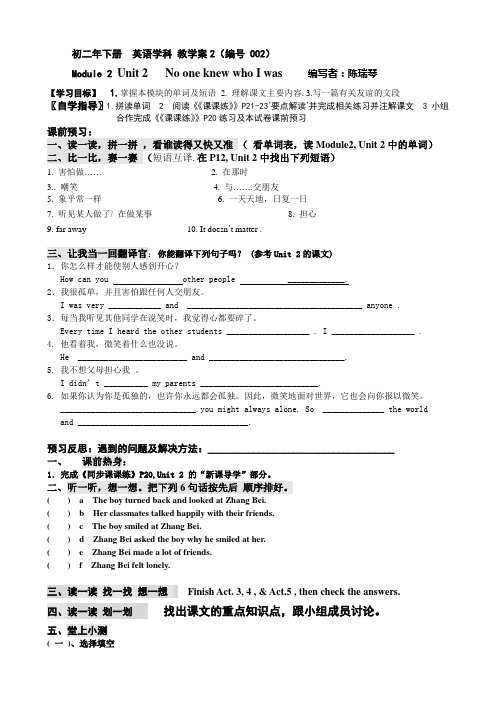
初二年下册英语学科教学案2(编号 002)Module 2 Unit 2 No one knew who I was编写者:陈瑞琴【学习目标】 1.掌握本模块的单词及短语2. 理解课文主要内容. 3.写一篇有关友谊的文段〖自学指导〗1.拼读单词 2 阅读《《课课练》》P21-23’要点解读’并完成相关练习并注解课文 3 小组合作完成《《课课练》》P20练习及本试卷课前预习课前预习:一、读一读,拼一拼,看谁读得又快又准(看单词表,读Module2, Unit 2中的单词)二、比一比,赛一赛(短语互译.在P12, Unit 2中找出下列短语)1. 害怕做……_________________________2. 在那时__________________________________3.. 嘲笑___________________________4. 与…….交朋友________________________5. 象平常一样__________________________6. 一天天地,日复一日__________________________7. 听见某人做了/ 在做某事_____________________________ 8. 担心______________________9. far away ______________________ 10. It doesn’t matter . ___________________________三、让我当一回翻译官:你能翻译下列句子吗? (参考Unit 2的课文)1.你怎么样才能使别人感到开心?How can you other people _____________.2.我很孤单,并且害怕跟任何人交朋友。
I was very ____________ and ________________________________________ anyone .3.每当我听见其他同学在说笑时,我觉得心都要碎了。
2020-2021学年八年级英语外研版下册Module2Experiences教案

(一)导入新课(用时5分钟)
同学们,今天我们将要学习的是Module 2 Experiences这一章节。在开始之前,我想先问大家一个问题:“你们在假期中有没有去过什么特别的地方?”这个问题与我们将要学习的内容密切相关。通过这个问题,我希望能够引起大家的兴趣和好奇心,让我们一同探索旅行经历的奥秘。
-学生需要学会在语境中使用这些词汇,如描述旅行的舒适度或某次经历。
(3)口语交流:能够询问和回答关于旅行经历的问题,进行简单的交流。
-学生需要掌握提问和回答的句型,如:“Have you ever been to...?”(你曾经去过……吗?)和“Yes, I have./No, I haven't.”(是的,我去过。/不,我没去过。)
2020-2021学年八年级英语外研版下册Module 2 Experiences教案
一、教学内容
本节课选自2020-2021学年八年级英语外研版下册Module 2 Experiences。教学内容主要包括以下章节:
1. Unit 1: He has been to the Great Wall.
-讨论过去旅行经历。
-学习使用现在完成时描述过去发生且与现在有关的动作。
2. Unit 2: It was very comfortable.
-描述过去假期中的活动。
-继续巩固现在完成时的运用。
3. Unit 3: Language in use.
-综合运用本模块所学语法、词汇和表达,进行口语交流。
三、教学难点与重点
1.教学重点
(1)核心语法:现在完成时的结构和用法,包括动词过去分词的变化规则。
-学生需要掌握“have/has +过去分词”结构,并能正确应用于描述过去发生的、与现在有关联的动作或经历。
外研版八年级英语下册教学案:Module 1 Exercise 期中复习2
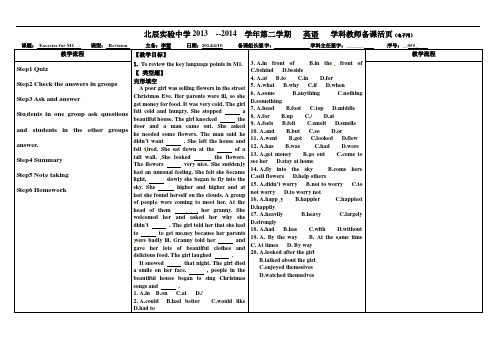
1.A.in B.on C.at D./
2.A.could B.had better C.would like D.had to
17.A.heavily B.heavy rgely D.strongly
18.A.had B.has C.with D.without
19.A. By the way B. At the s ame time C. At times D. By way
20.A.looked after the girl
8.A.for B.up C./ D.at
9.A.feels B.felt C.smelt D.smells
10.A.and B.but C.so D.or
11.A.went B.got C.looked D.flew
12.A.has B.was C.had D.were
13.A.get money B.go out e to seLeabharlann her D.stay at home
Step4 Summary
Step5 Not e taking
Step6 Homework
注:按照健康课堂相应课型流程编写。
3.A.in front of B.in the front of C.behind D.beside
4.A.at B.to C.in D.for
5.A.what B.why C.if D.when
6.A.some B.anything C.nothing D.something
外研版八年级英语下册期中复习:m1-m2
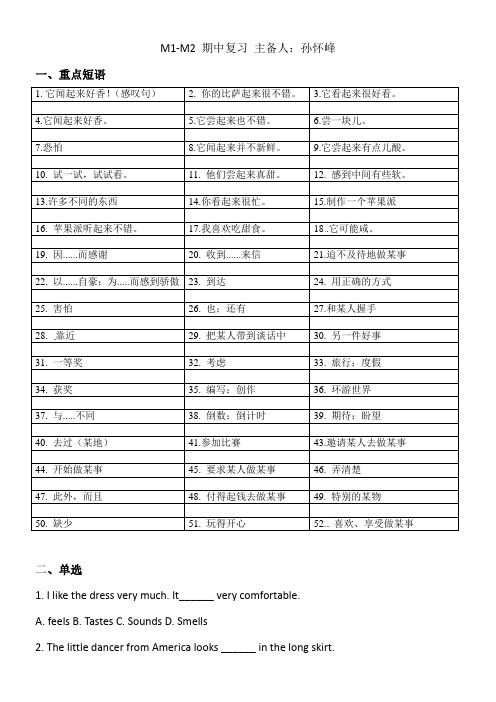
M1-M2 期中复习主备人:孙怀峰一、重点短语1.它闻起来好香!(感叹句)2. 你的比萨起来很不错。
3.它看起来很好看。
4.它闻起来好香。
5.它尝起来也不错。
6.尝一块儿。
7.恐怕8.它闻起来并不新鲜。
9.它尝起来有点儿酸。
10. 试一试,试试看。
11. 他们尝起来真甜。
12. 感到中间有些软。
13.许多不同的东西14.你看起来很忙。
15.制作一个苹果派16. 苹果派听起来不错。
17.我喜欢吃甜食。
18.它可能咸。
19. 因......而感谢20. 收到......来信21.迫不及待地做某事22. 以......自豪;为.....而感到骄傲23. 到达24. 用正确的方式25. 害怕26. 也;还有27.和某人握手28. 靠近29. 把某人带到谈话中30. 另一件好事31. 一等奖32. 考虑33. 旅行;度假34. 获奖35. 编写;创作36. 环游世界37. 与.....不同38. 倒数;倒计时39. 期待;盼望40. 去过(某地)41.参加比赛43.邀请某人去做某事44. 开始做某事45. 要求某人做某事46. 弄清楚47. 此外,而且48. 付得起钱去做某事49. 特别的某物50. 缺少51. 玩得开心52.喜欢、享受做某事二、单选1. I like the dress very much. It______ very comfortable.A. feelsB. TastesC. SoundsD. Smells2. The little dancer from America looks ______ in the long skirt.A. gentlyB. happilyC. beautifullyD. lovely3. We’d like _____ him to go to the magic show.A inviteB invitingC to inviteD invited4.-Whose bag is this? -It ______ be George’s , but I’m not sure.A mustB mightC needD can5.The boy said sorry to me because he did ______.A wrong somethingB something wrongC wrong anythingD anything wrong6.I’ll spend as much time as I can _____ in an old people’s home.A helpB helpedC helpingD to help7.You’d better have a good rest after your work is _____.A doB doingC didD done8.The two books are _____. There are a few ____ between them.A different; differentB different; differencesC differences; differentD differences; differences9.-Where is Tony? -He ___ the library. He ____ there one hour ago.A has gone to; went;B has gone to; has goneC has b een to; went;D has been to; has gone10.We have worked so long. Shall we stop ____ a re st?A haveB to havingC havingD to have二、根据所给词的适当形式填空1.Most young people enjoy _____ (listen) to rock music, but the old don’t.2.His tow sons are very _________(difference) from each other.3.I haven’t seen my grandma for a long time. I’m looking forward to _______(visit) hersoon.4.The company sent my uncle ______(work) in Shanghai.5.My father spends much time _______(finish) his work.6.We work harder to make our city _______(beautiful) than ever.7.What’s ______(much),traveling by train is one of the most comfortable ways.8.I’m going to Mary’s birthday party this evening. He ______ (invite) me already.9.-Why don’t you go to play table tennis, Jenny? It’s a nice day.- Because I __________(not wash) my clothes.10. I can’t find my wallet anywhere. I’m sure I ___________(lose) it.三、完形填空Dear Sir,I don’t understand (1)_____some parents make their kids help with house and chores(家务) at home. Kids these days already have enough (2)______from school. They do not have time to study and do housework, (3)______. Housework is a waste of their time. Could we just let them do their job as students? They should spend their time (4)______s choolwork in order to get good grades and get into a good university.Also, when they get older, they will have to do housework so there is no need for them to do it now. It is the parents’ job (5)______ a clean and comfortable environment at home for their children. And anyway, I think doing chores is not so difficult. I don’t mind doing them.Ms. MillerDear Sir,I think it is(6)_______for children to learn how to do chores and help their parentswith housework. It’s not enough to just get good grades at school.Children these days depend on their parents (7)_____. They are always asking, “Could you get his for me?” or “Coul d you help me with that?” Doing chores helps to develop children’s independence(独立) and teaches them how to (8)_____themselves. It also helps them to understand the idea of fairness(公平).Since they live in one house with their parents, they should know that (9)_______should do their part in keeping it clean and tidy. Our neighbors’ son got into a good college but during his first year, he had no idea how to take care of himself. As a result, he often fell ill and his grades dropped. The (10)______ kids learn to be independent, the better it is for their future.1.A. when B. where C. how D. why2.A. stress B. interests C. hobbies D. homework3.A. as well B. either C. also D. too4.A. in B. on C. at D. with5.A. provided B. providing C. to provide D. provides6.A. comfortable B. interesting C. important D. difficult7.A. too much B. a bit C. a bit of D. too many8.A. look into B. look at C. look for D. look after9.A. anyo ne B. everyone C. anything D. everything10.A. early B. slow C. earlier D. slower四、根据汉语完成句子(翻译)1.我们还没有爬过长城呢。
Module2Unit2教案八年级英语下册
外研版八年级下册Module 2 Unit 2 They have seen thePyramids 教案Objective:➢To enhance students' understanding and use of the present perfect tense.➢To develop skills in reading prehension, speaking, and writing about historical landmarks and personal experiences.➢To cultivate an appreciation for world heritage sites, specifically the Pyramids.Materials:✓Textbook: Foreign Research Edition, Grade 8, Module 2✓Interactive whiteboard or projector✓Worksheets on the present perfect tense✓Images or slides of the Pyramids and other world heritage sites✓Audio recordings related to the topic✓Whiteboard and markersClass Duration:IntroductionWarmUp Discussion:(1)Engage students in a brief conversation about famous worldlandmarks they know or have visited.(2)Introduce the Pyramids as one of the world's most famous heritagesites.Introduction to Present Perfect Tense:1)Explain the basics of the present perfect tense: formation and usage.2)Provide examples related to travel and visiting places (e.g., "I haveseen the Pyramids").Activity 1: Exploring the Present PerfectGrammar Exercise:(1)Distribute worksheets focusing on the present perfect tense.(2)Include exercises for forming sentences and converting past simpletense to present perfect.Interactive Practice :1)Use interactive exercises on the whiteboard where students e up andform sentences.2)Focus on experiences related to travel and sightseeing.Activity 2: Reading and prehensionReading Exercise :(1)Students read a short passage from the textbook about the Pyramids.(2)The passage includes historical facts and traveler's experiences.prehension Questions:1)Discuss the passage and ask prehension questions.2)Encourage students to answer using the present perfect tense.Activity 3: Speaking and Creative WritingGroup Discussion:(1)In groups, students discuss a world landmark they would like to visit.(2)Each student uses the present perfect tense to describe what theyhave learned or known about the place.Writing Exercise (5 min):◆Students write a short paragraph about a place they have visited or wishto visit, using the present perfect tense.Conclusion(1)Recap the day's lesson, emphasizing the use of the present perfecttense.(2)Preview the next lesson's topics.(3)Assign homework, if necessary.Homework✧Write a short essay about a historical landmark, using the presentperfect tense to describe experiences or facts learned.Prepare a small presentation on a world heritage site for the next class.。
外研版初中八年级英语下册 Module 2 集体备课教案含教学反思
自主学习方案1. 学生自学新词汇(见教材P112)完成学案中相关练习所对应的重点单词。
2. 学生自学教材(P10),找出课文中重点词组和句子。
完成学案中相关练习所对应的重点词组和重点句子。
课堂导学方案Step 1 情景导入教师询问学生是否参加过演讲比赛,是什么类型的演讲比赛,曾做过怎样的准备,得过什么样的名次等冋题。
环节说明:教师根据自己提出的问题,邀请学生来回答。
教师的问题既引起学生学习的兴趣,又激发了学生学习的积极性。
Step2完成教材1、2任务1. 要求学生朗读任务1方框里的单词,为下面的教学任务做准备。
2. 听录音,把单词标上序号,完成任务1。
3. 再听一次,从下面句子中选择正确的答案,完成任务2。
4. 小结训练。
根据所给汉语提示完成句子。
(1)I have ever(曾经)visited the USA.(2)Have you entered(参加)lots of speaking competitions (比赛)?(3)I am tired(疲劳的)today.环节说明:任务1〜2和小结训练,让学生对本节词汇掌握得更牢固。
Step 3完成教材3的对话理解1. 大声朗读3,找出重难点句子。
2. 教师详细讲解,学生熟记语言重点。
3. 播放录音,学生跟读。
4. 小结训练。
根据汉语提示完成句子。
(1)他们参加过比赛吗?Have they ever entered a competition.(2)太遗憾了。
That’s a pity.(3)那听起来太精彩了。
That sounds wonderful ,环节说明:通过教师讲解,学生熟记以及通过听力训练来提高学生阅读理解能力。
小结训练让学生熟悉教材。
Step4 问题探究1. ever adv.意为“曾经;从来”,它常与形容词或副词的最高级连用以加强语气,该词常用于现在完成时中。
如:Have you ever been to England?你曾经去过英格兰吗?—No,never.从来没有。
2020春外研版八年级英语下册Module 2 教案+教案设计+单元测试+译文+知识点归纳+阅读(付,49)
一、教案Module 2 ExperiencesUnit 1 I’ve also entered lots of speaking competitions.【教材分析】本课为Module 2的第一单元,主要内容为运用现在完成时来描述自己和他人的经历,例如演讲比赛经历、旅行经历等。
从全书来看,本单元承接下一模块现在完成时的学习和运用,内容有层次地展开,学生容易接受。
通过对本模块的学习,为下一模块的学习奠定了语言基础。
【教学目标】Knowledge objective:1. 词汇: ever, enter, competition, prize, dream, afford, pity, invite2. 现在完成时的结构和定义。
Ability objective:能听懂和阅读关于介绍经历的语言材料,能通过相关词汇和图片描述自己和他人的经历;能初步运用现在完成时,并写出相关的句子和短文。
Moral objective:乐于介绍自己的经历,和他人分享。
同时,学会倾听他人的美好的经历,理解他人的喜怒哀乐,建立良好的人际关系。
【教学重点】1. 重点短语和单词。
2. 现在完成时的运用。
【教学难点】1. 现在完成时的结构运用。
2. 现在完成时的不规则动词。
【教学方法】PWP method, task-based method and interactive approach【教学手段】A tape recorder, multimedia and some pictures【教学过程】Teaching Procedures:Step 1 Lead in1. Ss watch the video and answer “What’s this video about?”2. Ss look at the pictures and answer the questions.Step 2 Consolidate new wordsLook and say. The teacher shows the pictures of new words and let the students to say as quickly as possible.Step 3 Listen and number the words as you hear them1.Look at the words first.2.Then listen to the tape and number the words.Step 4 Listen again and choose the correct answer1.Look at the three sentences carefully.2.Listen to the tape again and choose the correct answer.Step 5 ReadingListen and read, then answer the two questions:1. What is Lingling entering?2. Who is going to enter the writing competition?Step 6 Work in pairs.1. Work in groups. Make a competition to find who can find out the most sentenceswhich are the present perfect tense.2. Read Part 3 and check what Linging and Tony have or have not done.3. Work in pairs. Ask an answer questions about what Linging and Tony have orhave not done.Step 7 Everyday EnglishMaster the main sentences in the passage.Step 8 Language pointsSs should master the main points from the passage in Part 3. If possible, let the students to say at first.1. I am entering a competition.我正参加一个比赛。
外研版八年级英语下册教学案:Module 2 Exercise 期中复习1
Step4 Summary
Step5 Note taking
Step6 Homework
注:按照健康课堂相应课型流程编写。
附件1:律师事务所反盗版维权声明
A.has gone to, travel
B.have been in, travelling
C.have e to, travelling
D.have gone in, travelling
5.How do you like Suzhou, Mr Green?
Oh, Isuch a beautiful city before.
【类型题】
单项选择
1.The car is too expensive, so I can’tit.
A.take B.afford C.clean D.have
2.The volunteers(志愿者)lovestudents in that small village in the west of China.
10.My brother’s eyes are bad because he enjoysin bed every night.
A.to read B.reading C.read D.reads
11.You’re late! Mr WangBeijing.
A.has gone to B.have been to C.went to D.is
A.to pick it up B.picking it up
C.to pick up it D.picking it up
- 1、下载文档前请自行甄别文档内容的完整性,平台不提供额外的编辑、内容补充、找答案等附加服务。
- 2、"仅部分预览"的文档,不可在线预览部分如存在完整性等问题,可反馈申请退款(可完整预览的文档不适用该条件!)。
- 3、如文档侵犯您的权益,请联系客服反馈,我们会尽快为您处理(人工客服工作时间:9:00-18:30)。
A.a, make B.the, make C.the, did D./, make
教学流程
Step1 Quiz
Step2 Check the answers in groups
Step3 Ask and answer
A.to pick it up B.picking it up
C.to pick up it D.picking it up
9.I like eating dumplingsnoodles, but I don’t like eating fishmeat.
A.and, or B.and, with C.or, with D.or, and
12.Ithe book again and again. It’s wonderful.
A.look B.have looked .read D.have read
13. The little boy enjoyedon this island that day.
A.hi mself B.herself C.myself D.ourselves
7.She five hundred English words so far.X k B 1 . c o m
A.has learned B.learned C.is learning D.learns
8.When L ily saw a hat on the ground, she stopped.
Module 2 Exercise教学案
课题:Exercise for M2 .课型:Revision主备: 日期:备课组长签字:学科主任签字:_______序号:_
教学流程
【教学目标】
1.To review the key language points in M2.
【类型题】
单项选择
1.The car is too expensive, so I can’tit.
B.have been in, travelling
C.have come to, travelling
D.have gone in, travelling
5.How do you likeSuzhou, Mr Green?
Oh, Isuch a beautiful city before.
A.don’t visit B.didn’t visit
C.haven’t visited D.hadn’t visited
6.TomtheUSA. Heback in two months.
A.has gone to, comes
B.has gone to, will be
C.had been to, comes
D.has been to, will be
10.My brother’s eyes are bad because he enjoysin bed every night.
A.to read B.reading C.read D.reads
11.You’re late! Mr WangBeijing.
A.has gone to B.have been to C.went to D.is
A.take B.afford C.clean D.have
2.The volunteers(志愿者)lovestudents in that small village in the west of China.
A.they B.them C.their D.themselves
3.It’s very hot in the room. Whyyour sweater?
Students in one group ask questions and students in the other gr oups answer.
Step4 Summary
Step5 Note taking
Step6 Homework
注:按照健康课堂相应课型流程编写。
A.don’t take off B.not take off
C.don’t you put on D.not put on
4.His parentsAmericafor years and they areback toChinafor a holiday.
A.has gone to, travel
